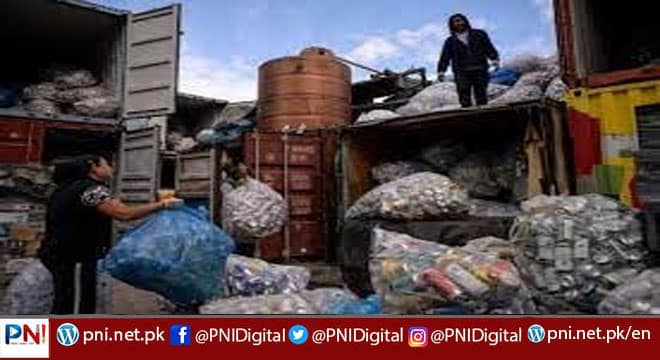New York, Oct 31 (AFP/APP):On a Brooklyn street, Laurentino Marin doesn’t stop to admire the Halloween decorations. Like every morning, the Mexican is busy filling a shopping cart with used cans and plastic bottles, which he will exchange for a few dollars.
Marin, who is 80, is one of New York’s estimated 10,000 “canners,” mostly older migrants from Latin America and China who scrape a living sorting and recycling plastics and aluminum.
Frail and stooped over, Marin stops in front of the stairs of a typical brownstone house that dots this neighborhood, lifts the lids of the trash cans and plunges his gloved hands into them.
He also searches through plastic packaging filled with garbage that sit on the sidewalk, awaiting collection from the city’s sanitation department.
Large see-through bags hang from his trolley, already full to the brim with a multicolored assortment of soda and beer cans.
“I’m looking for cans to survive,” the wrinkled-faced Marin, originally from Oaxaca, says in Spanish.
“I don’t receive help, there is no work, so you have to fight,” he adds.
Marin does not have an employer. He exchanges his cans and bottles in one of the city’s private recycling centers. For each one he gets a five-cent coin.
On an average day, he makes between $30 and $40, enough to supplement his daughter’s income from a laundromat so they can make their $1,800 monthly rent.
The five-cent sum was enshrined in a 1982 New York state law known as the “Bottle Bill” that was passed to encourage consumers to recycle. It hasn’t changed in almost 40 years.
“It had a really good impact of reducing litter across the state, especially in New York City,” said Judith Enck, founder of the anti-pollution movement, Beyond Plastics, which campaigned at the time for the law.
Enck now wants to see the amount doubled to ten cents.
“We didn’t realize that this would become a major source of income for many families, as it has,” she told AFP.
The state government says the bill facilitated the recycling of 5.5 billion pieces of plastic, glass and aluminum containers throughout New York in 2020 alone, more than half the 8.6 billion items sold.
The canners are a key part of that effort but they are unofficial workers, lacking the benefits and health insurance that would come with a recognized job.
They symbolize New York’s massive wealth inequality, which Eric Adams, all but certain to be elected the city’s next mayor Tuesday, has pledged to address.
“It’s hard. There are people who walk for miles and miles,” explains Josefa Marin, also Mexican.
Follow the PNI Facebook page for the latest news and updates.









